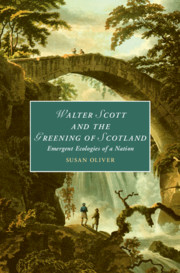Book contents
- Walter Scott and the Greening of Scotland
- Cambridge Studies in Romanticism
- Walter Scott and the Greening of Scotland
- Copyright page
- Dedication
- Contents
- Illustrations
- Acknowledgements
- Chronology of Works Referenced
- Chapter 1 Introduction
- Chapter 2 Shifting Ecologies
- Chapter 3 Toxic Ecologies, Ecogothic and Violence against the Land
- Chapter 4 Wild Places, Rarity and Extinction
- Chapter 5 Trees
- Chapter 6 Stone, Water, Air
- Notes
- Bibliography
- Index
- Cambridge Studies in Romanticism
Chapter 3 - Toxic Ecologies, Ecogothic and Violence against the Land
Published online by Cambridge University Press: 30 July 2021
- Walter Scott and the Greening of Scotland
- Cambridge Studies in Romanticism
- Walter Scott and the Greening of Scotland
- Copyright page
- Dedication
- Contents
- Illustrations
- Acknowledgements
- Chronology of Works Referenced
- Chapter 1 Introduction
- Chapter 2 Shifting Ecologies
- Chapter 3 Toxic Ecologies, Ecogothic and Violence against the Land
- Chapter 4 Wild Places, Rarity and Extinction
- Chapter 5 Trees
- Chapter 6 Stone, Water, Air
- Notes
- Bibliography
- Index
- Cambridge Studies in Romanticism
Summary
While land improvement is a commonplace theme in Scott’s writing, this chapter looks at counternarratives in which he foregrounds negative environmental impact. Literary forms that are discussed include elegy and gothic. Theories used include ecogothic and ecophobia. Species loss is shown to memorialize the untimeliness of war deaths. Case studies look at environments in which evidence of cruelty, including violence against the land, refuses to be buried or, conversely, remains manifest in the form of depletion and absence. Scott’s most disturbing fiction often features trees and other plants that have been mutilated, grow unusually and in strange places, or do not grow at all. The effect is a disruption of places more usually understood to be reliable, familiar or homely. The chapter demonstrates how Scott shows aesthetics commonplace to Romantic thought to be destabilized by what grows or fails to grow, creating uneasy and uncanny ecologies.
- Type
- Chapter
- Information
- Walter Scott and the Greening of ScotlandEmergent Ecologies of a Nation, pp. 64 - 87Publisher: Cambridge University PressPrint publication year: 2021

